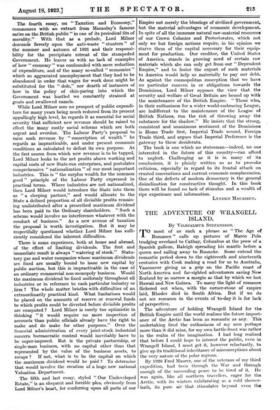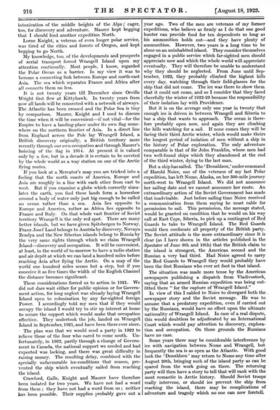THE ADVENTURE OF WRANGELL ISLAND.
By VILEJALMIIR, STEFANSSON.
TO most of us such a phrase as " The Age of Romance " calls up pictures of Marco Polo trudging overland to Cathay, Columbus at the prow of a Spanish galleon, Raleigh spreading his mantle before a queen and sailing away to Roanoke. Some extend the romantic period down to the eighteenth and nineteenth centuries with Cook making a road for us to Australia, Vancouver giving us a grip on the Pacific coast of North America and far-sighted adventurers saving New Zealand by as narrow a margin as that by which we lost Hawaii and New Guinea. To many the light of romance flickered out when, with the corner-stone of empire laid, Rhodes died in South Africa. But if we do not see romance in the events of to-day it is for lack of perspective.
The adventure of holding Wrangell Island for the British Empire until the world realizes the future importance of the Arctic has been as romantic as any. This undertaking fired the enthusiasm of my men perhaps more than it did mine, for my own battle-front was rather in the realm of the imagination. I had long realized that before I could hope to interest the public, even in Wrangell Island, I must get it, however reluctantly, to give up its traditional inheritance of misconceptions about the very nature of the polar regions.
By 1920 Fred Maurer, one of the veterans of my third expedition, had been through the War and through enough of the succeeding peace to be tired of it. He was again, like all northern travellers, eager for the Arctic, with its winters exhilarating as a cold showerbath, its pure air that stimulates beyond even the intoxication of the middle heights of the Alps ;* eager, too, for discovery and adventure. Maurer kept begging that I should lead another expedition North.
Lorne Knight, a veteran of even longer polar service, was tired of the cities and forests of Oregon, and kept begging to go North.
My knowledge, too, of the developments and prospects of aerial transport forced Wrangell Island upon my attention continually. Most people, I know, regarded the Polar Ocean as a barrier. In my view it was to become a connecting link between Europe and north-east Asia. The sea which separates France and Africa after all connects them no less.
It is not twenty years till December since Orville Wright first flew at Kittyhawk. In twenty years from now all lands will be connected with a network of airways.
The Atlantic has been crossed and the Polar Sea is tiny by comparison. Maurer, Knight and I used to discuss the time when it will be convenient—if not vital—for the Empire to have a landing-place under its own flag somewhere on the northern frontier of Asia. In a direct line from England across the Pole lay Wrangell Island, a British discovery originally, a British territory more recently through our own occupation and through Maurer's hoisting of the flag in 1914. At present it is valued only by a few, but in a decade it is certain to be coveted by the whole world as a way station on one of the Arctic flying routes.
If you look at a Mercator's map you are tricked into a feeling that the north coasts of America, Europe and Asia are roughly in a line with each other from east to west. But if you examine a globe which correctly simulates the earth, you find these lands form a horseshoe around a body of water only just big enough to be called an ocean rather than a sea. Asia lies opposite to Europe and America, rather as Africa lies opposite to France and Italy. On that whole vast frontier of Soviet territory Wrangell is the only red spot. There are many better islands, but we have given Spitsbergen to Norway, Franz Josef Land belongs to Austria by discovery, Novaya Zemlya and the New Siberian islands belong to Russia by the very same rights through which we claim Wrangell Island—discovery and occupation. It will be convenient, at least, in the world of to-morrow to have a radio station and air depot at which we can land a hundred miles before reaching Asia after flying the Arctic. On a map of the world one hundred miles seems but a step, but if you conceive it as five times the width of the English Channel the distance becomes significant.
These considerations forced us to action in 1921. We did not dare wait either for public opinion or for Govern ment action, for long neglect was already laying Wrangell Island open to colonization by any far-sighted foreign Power. I accordingly told my men that if they would occupy the island I would try to stir up interest at home to secure the support which would make that occupation effective. They undertook the job, landed on Wrangell Island in September, 1921, and have been there ever since.
The plan was that we would send a party in 1922 to relieve those of the four who cared to come south. Un fortunately, in 1922, partly through a change of Govern ment in Canada, the national support we needed and had expected was lacking, and there was great difficulty in raising money. The resulting delay, combined with the specially unfavourable ice-conditions that season, prevented the ship which eventually sailed from reaching the island.
Crawford, Galle, Knight and Maurer have therefore been isolated for two years. We have not had a word from them ; they have not had a word from us ; neither has been possible. Their supplies probably gave out a year ago. Two of the men are veterans of my former expeditions, who believe as firmly as I do that one good hunter can provide food for ten dependents so long as his ammunition holds out—and they have plenty of ammunition. However, two years is a long time to be alone on an uninhabited island. They consider themselves engaged in a public service which far-sighted men should appreciate now and which the whole world will appreciate eventually. They will therefore be unable to understand why they should be neglected. From June until September, 1922, they probably climbed the highest hills every day, watching through their field-glasses for the ship that did not come. The ice was there to show them that it could not come, and so I consider that they faced cheerfully the winter of 1922-23 because the responsibility of their isolation lay with Providence.
But it is on the average only one year in twenty that enough ice is driven in between Wrangell and Siberia to bar a ship that wants to approach. The ocean is therefore probably open now, and again they are climbing the hills watching for a sail. If none comes they will be facing their third Arctic winter, which would make theirs the longest period of isolation of men without a ship in the history of Polar exploration. The only adventure comparable is that of Sir John Franklin, whose men had two well-found ships which they abandoned at the end of the third winter, dying to the last man.
But a ship has sailed. The Donaldson,' under command of Harold Noice, one of the veterans of my last Polar expedition, has left Nome, Alaska, on her 500-mile journey north-west to Wrangell Island. We did not announce her sailing date and we cannot announce her route. An extraordinary action of the Soviet Government has made that inadvisable. Just before sailing time Noice received a communication from them saying he must cable for permission to sail. This permission, the message stated, would be granted on condition that he would on his way call at East Cape, Siberia, to pick up a contingent of Red Guards to take to Wrangell Island. The Red Guards would then confiscate all property of the British party. The Soviet attitude is the more extraordinary since it is clear (as I have shown in the articles published in the Spectator of June 9th and 16th) that the British claim to the island is strongest, the American second and the Russian a very bad third. Had Noice agreed to carry the Red Guards to Wrangell they would probably have been the first Russians who ever set foot in that island.
The situation was made more tense by the American newspapers publishing a dispatch from Vladivostock, saying that an armed Russian expedition was being outfitted there " for the capture of Wrangell Island."
In view of this I cabled to Noice to disregard both the . newspaper story and the Soviet message. He was to assume that a predatory expedition, even if carried out by the Russians, would have no effect upon the ultimate nationality of Wrangell Island. In case of a real dispute, this would doubtless be adjudicated by an International Court which would pay attention to discovery, exploration and occupation. On those grounds the Russians have no case.
Some years there may be considerable interference by ice with navigation between Nome and Wrangell, but frequently the sea is as open as the Atlantic. With good luck the Donaldson' may return to Nome any time after August 20th, bringing such of the island party as can be spared from the work going on there. The returning party will then have a story to tell that will rank with the most romantic in Arctic history. Should Soviet troops really intervene, or should ice prevent the ship from reaching the island, there may be complications of adventure and tragedy which no one can now foretell.



































 Previous page
Previous page